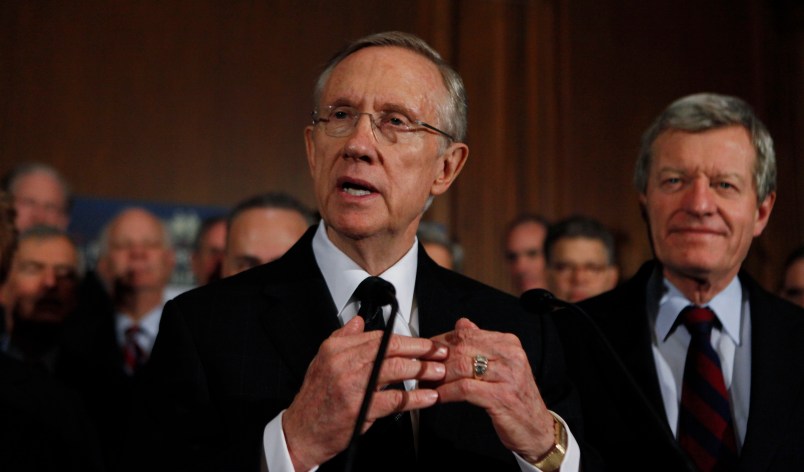A tax on medical device manufacturers under Obamacare has become a top target in the shutdown and debt limit showdowns. The House has voted to repeal the tax and the push has bipartisan support in the Senate. It was floated by Sen. Susan Collins (R-ME) during a White House meeting Friday as part of a broader proposal to resolve the impasse.
Thirty-four of 55 Senate Democrats, along with all Republicans, signaled their desire to repeal the 2.3 percent excise tax during a nonbinding vote in March. Notably, the opponents of the repeal measure included chief authors of Obamacare — Senate Majority Leader Harry Reid (D-NV), Senate Finance Chairman Max Baucus (D-MT) and Senate Health committee Chairman Tom Harkin (D-IA).
Opponents believe repealing the device tax is a terrible idea on the merits and the politics, even if it is offset. Not only do they see it as a gratuitous giveaway to an industry whose high profits have risen since the law passed, they worry it would aid persistent GOP efforts to unravel Obamacare by declaring open season on other taxes and fees that fund the law.
“Fracturing on anything related to the Affordable Care Act is one of the most moronic moves Democrats could make,” said a Senate Democratic aide, who requested anonymity to speak candidly. “Repealing the medical device tax is playing into House Republicans’ pathological obsession with dismantling the law at any cost. This is a more than $30 billion handout to one of the most profitable industries in the country when America can barely pay its bills. Device repeal could cause a domino effect with the insurance industry and big pharmaceutical companies wanting special carve outs too. If you care about the deficit or the debt, this giveaway to the device industry is blatant hypocrisy.”
Here’s the back story: during the health care reform debate of 2009, major industry players — hospitals, doctors, insurers and others — came to the negotiating table and offered substantial concessions in exchange for the new customers the law would bring them. The medical device industry, however, refused to play ball and got slapped with the 2.3 percent excise tax, which will raise roughly $30 billion over 10 years to help finance the law.
Device makers have since waged an all-out war against the tax, warning that it would harm jobs, growth and medical innovation. AdvaMed, the industry’s top lobbying group, has made it its mission to repeal the fee, and is winning the fight by already making the provision an exceedingly rare component of Obamacare which faces strong bipartisan opposition.
“We are very pleased with the broad bipartisan interest in repealing the device tax, and the level of focus and attention to this urgent issue,” said Wanda Moebius, a spokesperson for AdvaMed. “The House has now passed repeal legislation twice in a bipartisan fashion. We urge Congress to act to address this onerous tax this year, which has already resulted in lost jobs, cuts in R&D and threatens our global leadership in the development of new medical technologies.”
Repealing the tax got the votes of No. 2 and No. 3 Democratic Sens. Dick Durbin (D-IL) and Chuck Schumer (D-NY), along with liberal stalwarts like Sen. Elizabeth Warren (D-MA) and Al Franken (D-MN). The Republican-led House is strongly supportive of axing it.
“Today’s action shows there is strong bipartisan support for repealing the medical device tax, with Democrats and Republicans uniting behind our effort,” said Sen. Amy Klobuchar (D-MN), a leader in the push to scrap the tax, said back in March. “I will continue to work to get rid of this harmful tax so Minnesota’s medical device businesses can continue to create good jobs in our state and improve patients’ lives.”
The tax applies to “the sale of any taxable medical device by the manufacturer or importer of the device starting in 2013,” explains Paul Van de Water, a health policy expert at the liberal Center on Budget and Policy Priorities. “The tax does not apply to eyeglasses, contact lenses, hearing aids, wheelchairs, or any other medical device that the public generally buys at retail for individual use.” Van de Water contends that the industry’s claims are overblown, and that the tax would have little effect on jobs, innovation and consumers.
So far, Reid has led Senate Democrats to unanimously vote down a House-passed bill that repeals the device tax as part of a government funding measure. But the idea remains on the table as the White House and Republicans weigh longer-term solutions to end the government shutdown and remove the specter of default for the foreseeable future.






